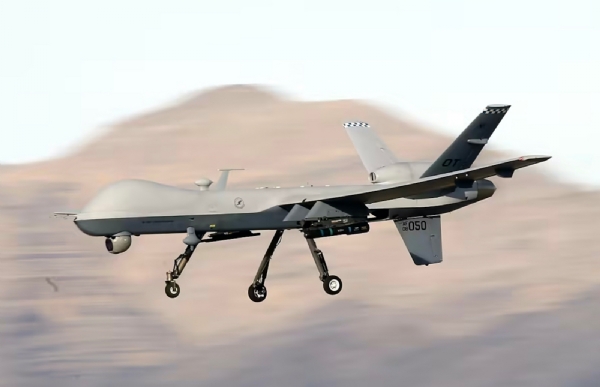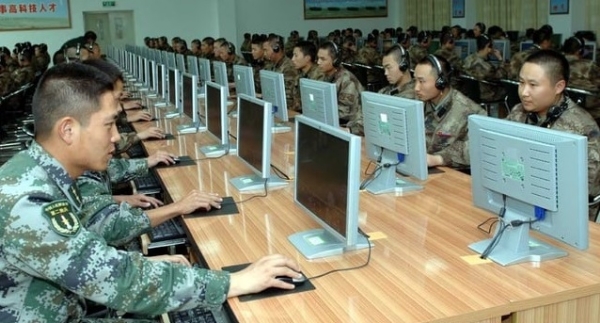#SecurityScan 34: Chinese Defence Budget, iPhone plant in India and more
The idea behind creation of such a battalion is to get more advantage for the security forces in their fight against the Naxals.
Total Views |
This article is a summary of important events that have taken place in last one week affecting, India's national security.
Under PM Modi, India more likely to use military force in face of Pakistan's and Chinese provocations says US intel report. India is the perfect place to firmly check the PRC’s designs of regional border expansion. The Place to Stop Chinese Aggression is on the Indian Border.

In its annual threat assessment report, the Office of the Director of National Intelligence highlighted that India, under Prime Minister Narendra Modi, was more likely than in the past to respond with military force to any provocation by Pakistan and China.
INTERNAL SECURITY
400 tribals of Chhattisgarh to join CRPF as constables
The idea behind creation of such a battalion is to get more advantage for the security forces in their fight against the Naxals. Those who were recruited know the local language, are familiar with the topography and will be able to get intelligence about the extremists easily.
EXTERNAL SECURITY
India's defence ministry signs agreement with HAL to procure 70 HTT-40 trainer aircraft for RS 6,800 cr
It has also signed a contract with Larsen & Toubro Limited for procurement of three Cadet Training Ships in the presence of Raksha Mantri Shri Rajnath Singh.
Indo-France Joint Military Exercise Frinjex-2023 to commence at Thiruvananthapuram
It is for the first time that the armies of both nations will engage in this format with each contingent comprising a Company Group each from the Thiruvananthapuram-based Indian Army troops and French 6th Light Armoured Brigade.
Need to maintain constant vigil on northern and western borders, coastline:
Rajnath Singh said at the biannual naval conference, attended by, Chief of Defence Staff Gen Anil Chauhan, Navy Chief Admiral R Hari Kumar and other naval commanders. They also witnessed a mega wargame involving Vikrant, the accompanying ships and all attack aircraft including MiG-29K deck-based jets. Armed forces are finalising response for action against suspected 'Chinese' spy balloons in future. "In the next 5-10 years, orders worth over $100 billion are expected to be placed through the defence sector and it will become a major partner in the economic development of the country. Today, our defence sector is on the runway. Soon, when it takes off, it will transform the country's economy," the minister said.
China unveils £185bn defence budget as it ‘prepares for war’
China will increase its defence budget by 7.2 per cent to 1.55 trillion yuan (£185 billion) this year, with a senior Communist Party figure saying the country should “prepare for war”.
MAKE IN INDIA - MAKE FOR WORLD
Dutch respond to US China policy with a plan to curb semiconductor tech exports

The Netherlands' government said it plans new restrictions on exports of semiconductor technology to protect national security, joining the United State's effort to curb chip exports to China.The U.S. in October imposed sweeping export restrictions on shipments of American chip making tools to China, but for the restrictions to be effective it needs other key suppliers in the Netherlands and Japan, who also oversee key chip making technology, to agree.
iPhone Maker Plans $700 Million India Plant in Shift From China
Apple suppliers look to lower reliance on China production .Apple Inc. partner Foxconn Technology Group plans to invest about $700 million on a new plant in India to ramp up local production, underscoring an accelerating shift of manufacturing away from China. Apple Inc. is reshuffling management of its international businesses to put a bigger focus on India, a sign of the nation’s growing importance.The shift will mark the first time that India becomes its own sales region at Apple, which has seen demand surge in the country.
Taiwan’s Foxconn is already making latest iPhones in India. The Taiwanese company, also known for its flagship unit Hon Hai Precision Industry Co., plans to build the plant to make iPhone parts on a 300-acre site close to the airport in Bengaluru. The factory may also assemble Apple’s handsets, and Foxconn may also use the site to produce some parts for its nascent electric vehicle business.
US and India Plan to Boost Chips Collaboration- Biden’s Commerce Chief
The US and India will sign an agreement to boost coordination of their chip-industry incentive plans and are discussing the best ways to avoid over-subsidization as the South Asian nation looks to boost its role in the global technology supply chain.
The memorandum of understanding focuses on information-sharing and policy dialogue, with greater collaboration on chips between the two governments.
What is the United States-India Initiative on Critical and Emerging Technologies (iCET)?
The iCET is not designed to deliver a single deal. Instead, it involves multiple streams for cooperation and collaboration between the United States and India on critical and emerging technologies.
INDIA COUNTERING CHINESE MULTI DOMAIN WAR
India’s Key to Keeping the Status Quo on Its Border With China
India’s current security strategies vis-à-vis China is deterrence-by-detection strategy, the LAC which is de facto border.
Japan, India hold joint military exercises before G20 in Delhi
China’s threat is growing, forcing new alliances between unexpected countries. Even in the way they shoulder their rifles and move across the wooded hill, the difference between the two groups of soldiers is obvious at a glance. The first unit, led by an officer in a turban, creeps forward stealthily along diagonal lines. The second jogs straight forward, fast and upright.
The scene is an urban warfare training centre in a military base in central Japan; the soldiers are taking part in an exercise simulating the recapture of buildings seized by terrorists. But more important than the scenario they are acting out is its symbolism, a co-operative enterprise that would have been unimaginable until a few years ago.
ECONOMIC SECURITY
India Where Digital Payments, Are Colossal in Scale
India’s homegrown instant payment system has remade commerce and pulled millions into the formal economy reports New York Times.
India's oil deals with Russia dent decades-old dollar dominance
U.S.-led international sanctions on Russia have begun to erode the dollar's decades-old dominance of international oil trade as most deals with India - Russia's top outlet for seaborne crude - have been settled in other currencies.
India has benefited immensely due to cheap oil imports from Russia, thereby helping to maintain the price line of petrol and diesel. It also made windfall profit by exporting refined petroleum products to USA and Europe.
India thus was able to convert a crisis into an opportunity and benefit from it.
USA, WESTERN WORLD COUNTERING CHINESE MULTI DOMAIN WAR
Chinese minister warns China- US on course for conflict
In his first news conference since taking office late last year, Qin's harsh language appeared to defy predictions that China might abandon its aggressive "wolf warrior" diplomacy in favor of more moderate rhetoric as the two countries face off over trade and technology, Taiwan, human rights and Russia's invasion of Ukraine.
China leads US in global competition for key emerging technology, study says
China has a "stunning lead" in 37 out of 44 critical and emerging technologies as Western democracies lose a global competition for research output, a security think tank said on Thursday after tracking defence, space, energy and biotechnology .The Australian Strategic Policy Institute (ASPI) said its study showed that, in some fields, all of the world's top 10 research institutions are based in China.
China’s Xi Rallies Private Firms to Help Beat US-Led Suppression
President Xi Jinping sought to rally China’s private sector to help overcome economic challenges that include suppression by countries led by the US, China National Radio reported.China is grappling with “comprehensive containment and suppression by western countries led by the US over the past few years, which have brought unprecedented and severe challenges for China’s development,”
China’s military to refocus on R&D after decade-long hardware drive
More PLA resources to go towards integration and modernisation of the armed forces – rather than buying weapon systems.
Some of the changes are being informed by the lessons learned from the Ukraine conflict.
Pentagon sees giant cargo cranes as possible Chinese spying tools
Equipment at U.S. ports could pose risk of surveillance or sabotage, officials say.U.S. officials are growing concerned that giant Chinese-made cranes operating at American ports across the country, including at several used by the military, could give Beijing a possible spying tool hiding in plain sight.

Some national-security and Pentagon officials have compared ship-to-shore cranes made by the China-based manufacturer, ZPMC, to a Trojan horse. While comparably well-made and inexpensive, they contain sophisticated sensors that can register and track the provenance and destination of containers, prompting concerns that China could capture information about materiel being shipped in or out of the country to support U.S. military operations around the world.
The cranes could also provide remote access for someone looking to disrupt the flow of goods.
China has the capability to weaponize any thing and it is doing so. Therefore, the best option to protect a country from Chinese mischief is to boycott everything made in China.
Antony Blinken - US ‘not distracted’ by Ukraine war, Quad offers ‘choice’ from China
During a Quad meeting with partners India, Japan and Australia, Antony Blinken said the bloc offered ‘choice’ to countries, in a reference to China. Blinken’s comments come as the US tries to reassure smaller countries it is still focused on balancing a bolder China despite Washington’s efforts in the Ukraine war.
U.S. Export Limits Target 28 Chinese Entities, Citing Ties to Iranian Military
The U.S. Commerce Department on Thursday targeted Chinese entities with export restrictions, part of a broader effort by the Biden administration to mitigate a growing national security threat from China.
In adding the 28 Chinese firms and individuals to its Entity List, Commerce’s Bureau of Industry and Security said the firms represented a range of potential national security risks including through alleged dealings with an Iranian electronics firm previously sanctioned by the U.S. for its ties to Tehran’s military.
Trudeau Orders Review of Alleged Chinese Election Interference
Prime Minister Justin Trudeau yielded to pressure over allegations China interfered in Canada’s elections, appointing a special investigator to study the matter.“Upholding confidence in our democratic process in our elections, in our institutions, is of utmost importance,” the prime minister told reporters Monday evening in Ottawa.
Australia to buy up 5 Virginia class submarines as part of AUKUS
Australia is expected to buy up to five U.S. Virginia class nuclear powered submarines in the 2030's as part of a landmark defense agreement between Washington, Canberra and London in a deal that would present a new challenge to China.
Japan mulls drones to deter rising Chinese air and sea intrusions
Japan is mulling the use of drones for aerial interception missions as the cost of scrambling manned fighter aircraft becomes increasingly unsustainable amid intensified Chinese air incursions.
Japan Self-Defense Forces are considering using drones instead of manned aircraft to intercept Chinese aircraft that intrude into Japan’s airspace.
Japan will this year start tests using drones to chase warships to gauge performance and functionality. If successful, drones will be tested against aircraft.

Sending manned fighters to intercept intruding aircraft costs 40 times more than a comparable drone-based interception mission. Japan is considering purchasing Turkish Bayraktar TB-2 or US MQ-9 Reaper drones for the task.
Japan aims to send drones to identify intruding aircraft first, after which manned fighters will be scrambled if the aircraft is deemed a threat.
Japan’s plan to use drones to intercept foreign aircraft is in response to China’s rising incursions. China’s aerial attrition strategy aims to inflict losses on Japan by forcing it to sustain a tempo of operations beyond its capabilities.
This strategy can result in miscalculation and unintended escalation due to pilot and ground crew fatigue, aircraft losses via wear and tear, strained logistics and maintenance, and accidents.
The Japan Air Self-Defense Force (JASDF) is especially vulnerable to the strategy. The JASDF’s 201 F-15Js, Japan’s premier fighter since the 1980s, have suffered from a spate of accidents, slow pace of upgrade programs and potentially unfeasible upgrade costs. The F-15 base design is also set to be obsolete by 2024, which reduces room for upgrades and the potential for improved variants.
Important lesson for India from these innovative tactics. After all the cost of countering Chinese hybrid war has to be brought down.
China Hones Its Influence Tactics in New Zealand
As China expanded its influence efforts beyond its near neighbors, New Zealand's liberal democracy became a prime target.
Beijing had always intervened in some of its nearest neighbors, like Taiwan and Southeast Asia, but it had mostly avoided wielding extensive influence within most countries' political systems, universities, and societies. That has changed under Xi, who has overseen a massive expansion of efforts to wield power within other states.
Chinese Influence Campaigns and Disinformation
There has been another motivating factor behind this expanded campaign to wield influence inside other countries: opportunity. Until recently, many leading liberal democracies were vulnerable to China's tactics. Having gained some experience with influence tactics in places like Hong Kong, Taiwan, and Southeast Asian states, Beijing began to adopt these strategies more widely—particularly in New Zealand and Australia. New Zealand was, at first, one of the softest targets among liberal democracies.
Why Chinese espionage is such a great success: USA Think Tank Report
The US has provided an easy guide path for Chinese spies and surveillance balloons Spy balloons are one small part of an enormous, “whole of society” decades-long Chinese espionage campaign against the United States. And unfortunately, it has been successful. It’is a mix of technical and human platforms that aim to obtain (by any means) other countries’ secrets.
However, the People’s Republic of China (PRC) operates on a completely different scale. It’s not just the Ministry of State Security (MSS) deploying officers to recruit spies.
China’s 2017 National Intelligence Law explicitly requires all Chinese companies and citizens to assist: “An organization or citizen shall support, assist in and cooperate in national intelligence work in accordance with the law and keep confidential the national intelligence work that it or he knows. Beijing will capitalize on anything potentially useful.

China’s spies also capitalize on all the freedoms the United States has to offer. These include freedom of movement, freedom to call yourself a journalist (even if you are an MSS operative), and freedom to buy strategically situated real estate to serve as collection platforms.
China goes after military and state secrets, but also commercial secrets and intellectual property — literally anything potentially useful.
It’s been doing this for years. The idea is to “leap over stages” and advance China’s economic development. And, in that, the Chinese government doesn’t have a monopoly on spying.
Individual Chinese will steal technology and know-how, with the aim to set up their own companies. And, an American company that sets up in China is making things easy for Chinese spies — both government spies and “freelancers.”
From 1987 to 2021, at least 162 Chinese scientists who had worked at Los Alamos — the US research lab where the atomic bomb was developed — returned to the PRC to contribute to China’s R&D programs. Besides nuclear weapons designs, these “alumni” have helped the PRC advance key military and dual-use technologies.
There have been some efforts at self-defense by USA, but they often aren’t sustained. President Trump closed China’s Houston consulate — a hotbed of spying — and forced the Department of Justice to launch the Initiative against Chinese spies at US universities.
Then, shortly after taking office, Biden shut down the China Initiative. American academics had claimed it was racist.
The US does spy, but it’s with the traditional methods: electronic and satellite surveillance and a relatively tiny number of intelligence officers trying to recruit Chinese spies — who might produce useful information. The US does not do “commercial” espionage.
The Americans are not serious about stopping Chinese, as a young Marine officer in Afghanistan some time back: “Sir, I think we want to lose.
INSIDE UNHAPPY TURBULENT CHINA
China’s, aging population disaster for Chinese economy
China’s aging population presents many challenges for its economy, including a shrinking workforce and increased pressure on the healthcare and pension systems.
It also further complicates China’s aspirations to shift towards a consumption-driven growth model, as older individuals tend to save more and spend less compared to those in younger generations.
In response to this demographic shift, the Chinese government is moving forward with its plan to gradually raise the legal retirement age. But without addressing the pervasive issue of age-based discrimination in the workplace, raising the retirement age alone may have a limited impact on retaining older workers.
China's collapsing birth and marriage rates are also a cause for worry.
Bao Fan and the curious game of hide-and-seek involving Chinese business mavericks
This distressing game of billionaire hide-and-seek has a chilling effect on the investment climate in China.After being missing for 10 days, Mr Bao Fan, founder and chief executive of China Renaissance Holdings and high-flying technology dealmaker in China, has resurfaced and is said to be assisting the authorities.
LESSONS FROM UKRAINE WAR
Does Technology Win Wars?The U.S. Military Needs Low-Cost Innovation—Not Big-Ticket Boondoggles-says US study
To avoid becoming the Soviet Union, Washington must remember that having the right technology is necessary but insufficient to win wars. If the United States hopes to persevere against Russia in the short term and China in the long term, it must consider the economic impact of technology even as it pursues a technological advantage.
Studying Ukraine war, China's military minds fret over US missiles, Starlink
China needs the capability to shoot down low-earth-orbit Starlink satellites and defend tanks and helicopters against shoulder-fired Javelin missiles, according to Chinese military researchers who are studying Russia's struggles in Ukraine in planning for possible conflict with U.S.-led forces in Asia.
A Reuters review of almost 100 articles in more than 20 defence journals reveals an effort across China's military-industrial complex to scrutinise the impact of U.S. weapons and technology that could be deployed against Chinese forces in a war over Taiwan.
--



